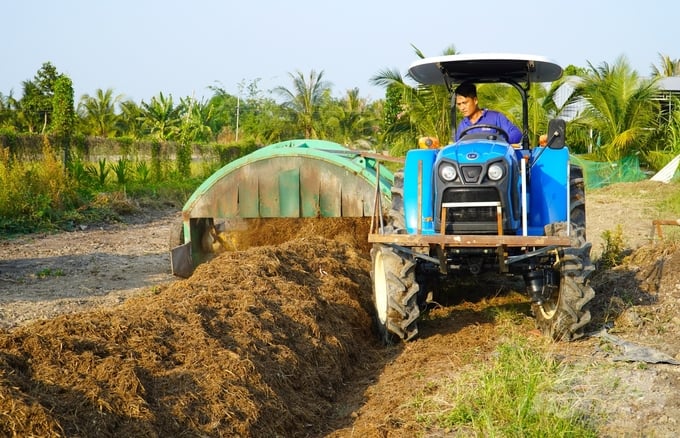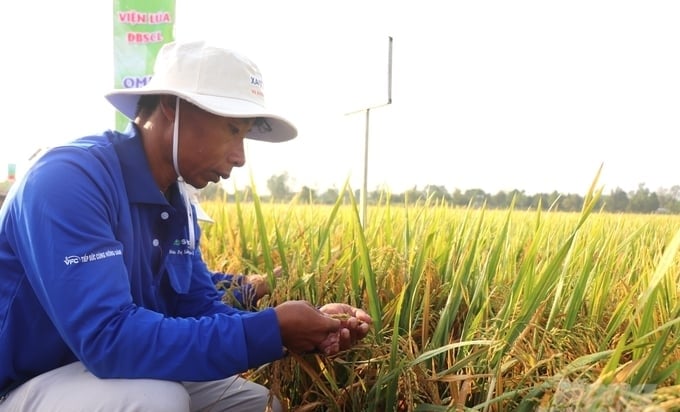June 15, 2025 | 11:36 GMT +7
June 15, 2025 | 11:36 GMT +7
Hotline: 0913.378.918
June 15, 2025 | 11:36 GMT +7
Hotline: 0913.378.918
Irrigation systems, inter-regional transportation, logistics, and mechanization with a total cost of US$ 375 million (equivalent to VND 9,000 billion) are proposed to be invested in growing low-emission, high-quality rice.
The project to support technical infrastructure for low-carbon rice in the Mekong Delta, proposed by the Ministry of Agriculture and Rural Development, was presented at a consultation conference in Can Tho on March 19. Of the total capital, US$ 360 million was borrowed from the World Bank, and US$ 15 million was borrowed from the counterpart capital of Vietnam.
Deploy the sustainable development project of 1 million hectares specializing in high-quality rice cultivation with low emissions associated with green growth in the Mekong Delta until 2030 (referred to as the 1 million hectares high-quality rice project), during the period 2024 - 2025, Can Tho City has 8 businesses and 38 cooperative groups/cooperatives registered to participate with a total area of about 38,000 hectares.

Can Tho City proposes to invest in a series of machinery for rice cultivation to reduce emissions. Photo: Kim Anh.
By 2026 - 2030, registered businesses will increase to 28 units and 50 cooperative groups/cooperatives, ensuring a cultivation area of 50,000 hectares.
Specifically, Can Tho City's agricultural sector proposed investing in an irrigation system to improve water management and use efficiency, including dredging nearly 1.8 million m3 of canals, Investing in 29 culverts, pumping stations, electric pumps, and building nearly 216,000m of irrigation embankments.
As for the transportation system, Can Tho City is expected to invest in building 89 traffic bridges and 3,300m of roads to help farmers reduce transportation costs.
In addition, there are activities to support digital agriculture through investing in a series of machines for synchronous mechanization for rice production to reduce emissions, such as straw rolling machines and unmanned agricultural aircraft (drones), combine harvesters, cultivators, tractors, transplanters, grain separator, field water level sensor. Also, 4 warehouses and 2 drying ovens will be built to facilitate storage and processing.
In addition, Can Tho City will also deploy programs to support online platforms and e-commerce to help connect farmers with service providers and markets; Training to improve staff capacity and transfer technology to farmers in the project area; Build demonstration models for applying scientific and technical advances and applying digital technology to production; Training and deploying the Measurement, Reporting and Verification (MRV) system as a basis for granting carbon credits for areas that have applied emission-reducing rice cultivation processes.
The City's agricultural sector is expected to build an electronic information portal to store, manage, retrieve and exploit agricultural data for management, linkage, and e-commerce in accordance with the management system of the Ministry of Agriculture and Rural Development.

Training to improve the capacity of officials and transfer technology to farmers is one of the key contents that Can Tho City's agricultural sector focuses on implementing. Photo: Kim Anh.
Deputy Head of the Department of Management of Agricultural Projects, Ministry of Agriculture and Rural Development Nguyen The Hinh informed that the Project to support technical infrastructure for low-carbon rice in the Mekong Delta region is proposed based on the Project of 1 million hectares of high-quality rice cultivation area and low emissions has been approved by the Government in 12 Mekong Delta provinces, including An Giang, Kien Giang, Dong Thap, Long An, Soc Trang, Can Tho, Bac Lieu, Tra Vinh, Hau Giang, Ca Mau, Tien Giang and Vinh Long.
According to Mr. Nguyen The Hinh, the Project's goal is to form 1 million hectares of high-quality and low-emission rice-growing areas associated with reorganizing the production system along the value chain, Applying sustainable farming processes to increase value and sustainably developing the rice industry, improve production and business efficiency, income and life of rice growers; protect the environment, adapt to climate change and reduce greenhouse gas emissions, contributing to implementing Vietnam's international commitments.
In addition, the Project will also encourage the participation of the private sector and support the development of the low-carbon rice market, thereby creating a favorable policy and technical framework to support rice production with low carbon.
Deputy Minister of Agriculture and Rural Development Tran Thanh Nam commented that the Project could help fundamentally transform the Mekong Delta's production method in the rice industry, so it has received the attention of many international organizations and farmers in agreement. Therefore, after the conference, the Agricultural Project Management Board will soon send a document to the 12 provinces and cities participating in the Project so that localities can consolidate or establish a new Provincial Project Management Board to act as a basis. The Department directs implementation and provides information so that the Ministry of Agriculture and Rural Development can soon complete the Project.
Translated by Tuan Huy
![Turning wind and rain into action: [4] Bringing climate bulletins to remote and isolated areas](https://t.ex-cdn.com/nongnghiepmoitruong.vn/608w/files/linhnhp/2025/06/14/1152-z6704423696987_15fd32ffc26d590d204d520c9dac6786-nongnghiep-151141.jpg)
(VAN) The Vietnam Agriculture and Nature Newspaper interviewed Mr. Vu Thai Truong, Acting Head of Climate Change and Environment at UNDP Vietnam, to gain deeper insight into how climate bulletins are delivered to farmers.

(VAN) In Tien Giang, a high-tech shrimp farm has developed a distinctive energy-saving farming model that has yielded promising results.
![Turning wind and rain into action: [3] 300.000 farmers benefit from agro-climatic bulletins](https://t.ex-cdn.com/nongnghiepmoitruong.vn/608w/files/news/2025/06/12/e5a48259d6a262fc3bb3-nongnghiep-125122.jpg)
(VAN) The agro-climatic bulletin has become a valuable tool for farmers in the Mekong Delta. After more than five years of implementation, the initiative is gradually being expanded nationwide.
![Turning wind and rain into action: [2] Providing forecasts to the people](https://t.ex-cdn.com/nongnghiepmoitruong.vn/608w/files/news/2025/06/12/e5a48259d6a262fc3bb3-nongnghiep-103927.jpg)
(VAN) In addition to improving the quality of hydrometeorological forecasts, putting forecast bulletins into practical use is crucial for production and disaster prevention.

(VAN) Blue carbon is receiving attention for its rapid absorption capacity and vast potential. It represents a promising nature-based solution to respond to climate change.
/2025/06/11/3507-1-161904_583.jpg)
(VAN) Seagrass beds and coral reefs serve as 'cradles' that nurture life in the ocean depths, creating rich aquatic resources in Vietnamese waters.
![Turning wind and rain into action: [1] Forecasting for farmers](https://t.ex-cdn.com/nongnghiepmoitruong.vn/608w/files/news/2025/06/11/e5a48259d6a262fc3bb3-nongnghiep-111919.jpg)
(VAN) Weather is no longer just a matter of fate. Forecasts have now become an essential companion for farmers in every crop season.